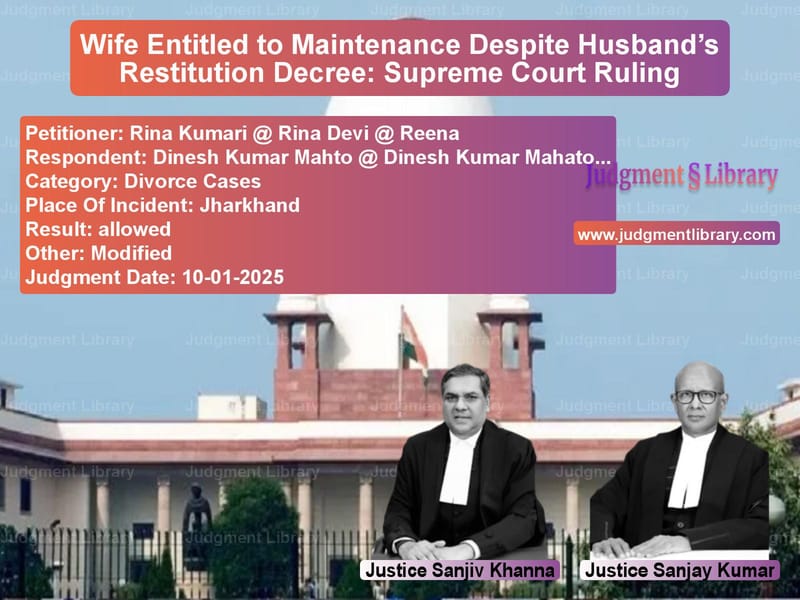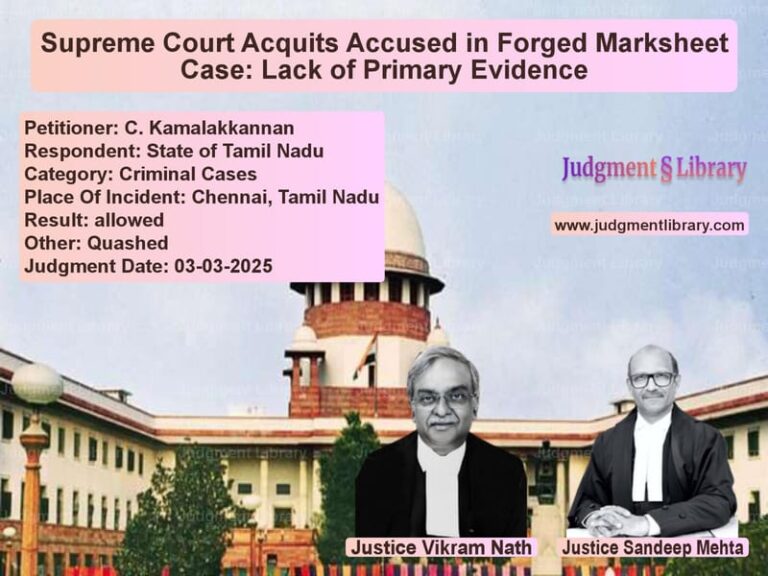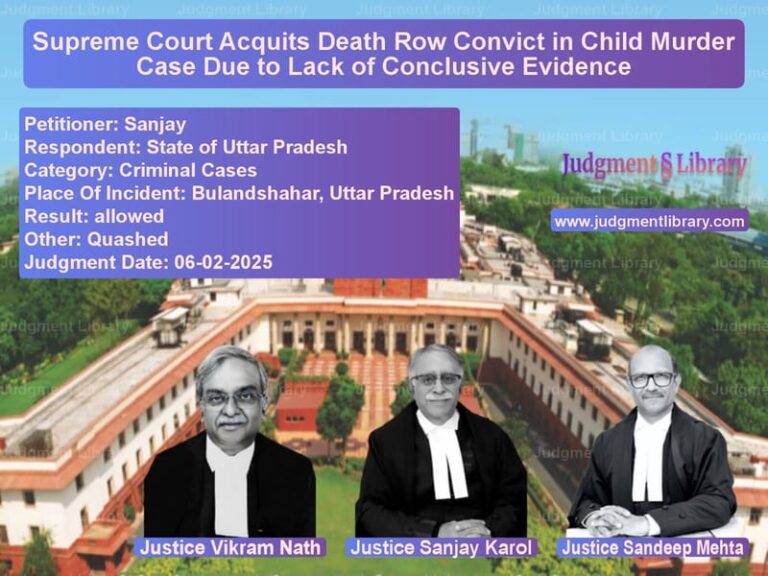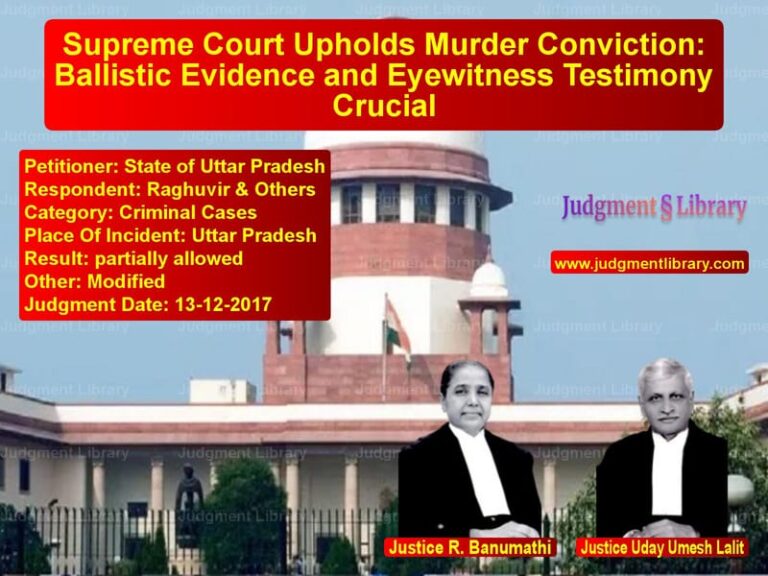Wife Entitled to Maintenance Despite Husband’s Restitution Decree: Supreme Court Ruling
The Supreme Court of India, in the case of Rina Kumari @ Rina Devi @ Reena vs. Dinesh Kumar Mahto & Anr., examined whether a wife who refused to comply with a restitution of conjugal rights decree could still claim maintenance under Section 125 of the Code of Criminal Procedure (CrPC). The Court ruled in favor of the wife, overturning the Jharkhand High Court’s decision, which had denied her maintenance.
Background of the Case
The appellant, Reena, married the respondent, Dinesh Kumar Mahto, on May 1, 2014. However, she left her matrimonial home in August 2015, citing cruelty and dowry demands. Dinesh filed a suit for restitution of conjugal rights under Section 9 of the Hindu Marriage Act, 1955, which was decreed in his favor in April 2022. Despite this, Reena did not return to the matrimonial home.
Reena had also filed a complaint under Section 498A IPC against Dinesh, which led to his imprisonment and suspension from his job as a Junior Engineer in the Jharkhand State Electricity Board. Additionally, she filed a maintenance case under Section 125 CrPC, which was initially granted by the Family Court in February 2022. However, the Jharkhand High Court reversed this order in August 2023, citing that her refusal to live with Dinesh disqualified her from maintenance under Section 125(4) CrPC.
Key Legal Issues
- Does a restitution of conjugal rights decree automatically disqualify a wife from claiming maintenance under Section 125 CrPC?
- Can a wife refuse to live with her husband for valid reasons despite a restitution decree?
- Does Section 125(4) CrPC apply to cases where the wife has sufficient reasons to stay apart?
Petitioner’s Arguments
- Reena argued that she had left her matrimonial home due to dowry demands, ill-treatment, and a lack of basic amenities such as toilet access and an LPG stove for cooking.
- She contended that Dinesh had not genuinely tried to bring her back but instead used the restitution decree as a defense to deny her maintenance.
- She also pointed out that even after the decree was passed, Dinesh made no effort to execute it or seek a divorce.
Respondent’s Arguments
- Dinesh claimed that he had always been willing to take Reena back and that the restitution decree proved she left without a valid reason.
- He argued that under Section 125(4) CrPC, a wife who refuses to live with her husband without sufficient reason is not entitled to maintenance.
- He stated that he was suspended from his job due to Reena’s criminal complaint and could not afford high maintenance payments.
Supreme Court’s Observations
1. Restitution Decree Does Not Automatically Disqualify a Wife from Maintenance
The Court clarified that a decree for restitution of conjugal rights does not, by itself, prevent a wife from seeking maintenance. The Court stated:
“A decree for restitution of conjugal rights secured by a husband coupled with non-compliance therewith by the wife would not be determinative straightaway either of her right to maintenance or the applicability of the disqualification under Section 125(4) Cr.P.C.”
2. Valid Grounds for Staying Away
The Court ruled that Reena had sufficient reasons to stay away from her husband, including:
- Past ill-treatment and dowry demands.
- Denial of basic facilities such as toilet access and proper cooking arrangements.
- Dinesh’s lack of genuine effort to reconcile post-decree.
The Court observed:
“Reena had more than sufficient reason to not return to her matrimonial home, despite the restitution decree.”
3. Husband’s Intent in Obtaining the Restitution Decree
The Court noted that Dinesh had done nothing to enforce the decree, which suggested he was using it solely to evade maintenance obligations. It stated:
“Dinesh sought to protect himself from a claim by Reena for maintenance by projecting the disobeyed restitution decree as a defense.”
Final Verdict
- The Jharkhand High Court’s ruling was set aside.
- The Family Court’s order granting Reena ₹10,000 per month in maintenance was reinstated.
- Dinesh was ordered to pay the maintenance amount from August 3, 2019, along with arrears in three equal installments by December 31, 2025.
Conclusion
This ruling is a landmark decision that clarifies that a restitution of conjugal rights decree does not automatically bar a wife from seeking maintenance. It reinforces the principle that women should not be forced into unsafe marital situations under financial pressure. The judgment ensures that maintenance laws continue to serve their purpose of providing financial security to women, even in complex matrimonial disputes.
Petitioner Name: Rina Kumari @ Rina Devi @ Reena.Respondent Name: Dinesh Kumar Mahto @ Dinesh Kumar Mahato & Anr..Judgment By: Justice Sanjiv Khanna, Justice Sanjay Kumar.Place Of Incident: Jharkhand.Judgment Date: 10-01-2025.
Don’t miss out on the full details! Download the complete judgment in PDF format below and gain valuable insights instantly!
Download Judgment: rina-kumari-@-rina-d-vs-dinesh-kumar-mahto-@-supreme-court-of-india-judgment-dated-10-01-2025.pdf
Directly Download Judgment: Directly download this Judgment
See all petitions in Alimony and Maintenance
See all petitions in Domestic Violence
See all petitions in Mutual Consent Divorce
See all petitions in Judgment by Sanjiv Khanna
See all petitions in Judgment by Sanjay Kumar
See all petitions in allowed
See all petitions in Modified
See all petitions in supreme court of India judgments January 2025
See all petitions in 2025 judgments
See all posts in Divorce Cases Category
See all allowed petitions in Divorce Cases Category
See all Dismissed petitions in Divorce Cases Category
See all partially allowed petitions in Divorce Cases Category







